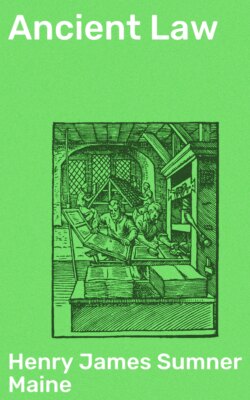Ancient Law

Реклама. ООО «ЛитРес», ИНН: 7719571260.
Оглавление
Henry James Sumner Maine. Ancient Law
Ancient Law
Table of Contents
CHAPTER I
CHAP. II
CHAP. III
CHAP. IV
CHAP. V
CHAP. VI
CHAP. VII
CHAP. VIII
CHAP. IX
Footnotes
CHAP. X
Отрывок из книги
Henry James Sumner Maine
Published by Good Press, 2022
.....
CHAP. X.
The epoch of Customary Law, and of its custody by a privileged order, is a very remarkable one. The condition of the jurisprudence which it implies has left traces which may still be detected in legal and popular phraseology. The law, thus known exclusively to a privileged minority, whether a caste, an aristocracy, a priestly tribe, or a sacerdotal college, is true unwritten law. Except this, there is no such thing as unwritten law in the world. English case-law is sometimes spoken of as unwritten, and there are some English theorists who assure us that if a code of English jurisprudence were prepared we should be turning unwritten law into written—conversion, as they insist, if not of doubtful policy, at all events of the greatest seriousness. Now, it is quite true that there was once a period at which the English common law might reasonably have been termed unwritten. The elder English judges did really pretend to knowledge of rules, principles, and distinctions which were not entirely revealed to the bar and to the lay-public. Whether all the law which they claimed to monopolise was really unwritten, is exceedingly questionable; but at all events, on the assumption that there was once a large mass of civil and criminal rules known exclusively to the judges, it presently ceased to be unwritten law. As soon as the Courts at Westminster Hall began to base their judgments on cases recorded, whether in the year books or elsewhere, the law which they administered became written law. At the present moment a rule of English law has first to be disentangled from the recorded facts of adjudged printed precedents, then thrown into a form of words varying with the taste, precision, and knowledge of the particular judge, and then applied to the circumstances of the case for adjudication. But at no stage of this process has it any characteristic which distinguishes it from written law. It is written case-law, and only different from code-law because it is written in a different way.
.....